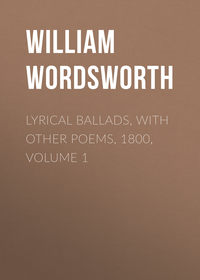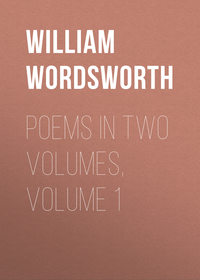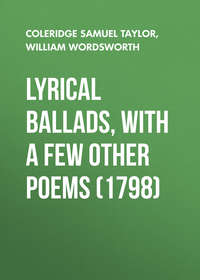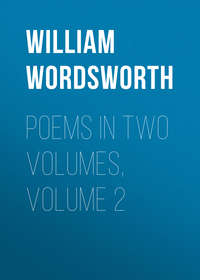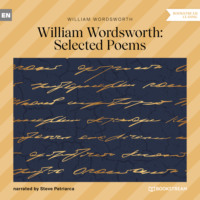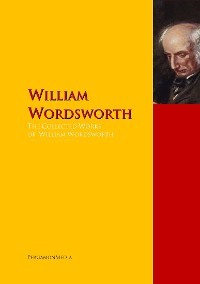Lyrical Ballads with Other Poems, 1800, Volume 2
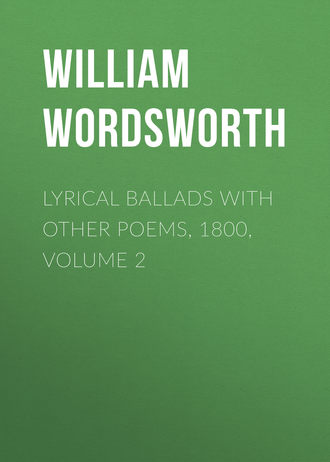 полная версия
полная версияLyrical Ballads with Other Poems, 1800, Volume 2
Жанр: зарубежная поэзиязарубежная классикастихи и поэзиялитература 19 векасерьезное чтениеcтихи, поэзия
Язык: Английский
Год издания: 2017
Добавлена:
Настройки чтения
Размер шрифта
Высота строк
Поля
ELLEN IRWIN,
Or the BRAES of KIRTLE.4
Fair Ellen Irwin, when she sate Upon the Braes of Kirtle, Was lovely as a Grecian Maid Adorn'd with wreaths of myrtle. Young Adam Bruce beside her lay, And there did they beguile the day With love and gentle speeches, Beneath the budding beeches. From many Knights and many Squires The Brace had been selected, And Gordon, fairest of them all, By Ellen was rejected. Sad tidings to that noble Youth! For it may be proclaim'd with truth, If Bruce hath lov'd sincerely, The Gordon loves as dearly. But what is Gordon's beauteous face? And what are Gordon's crosses To them who sit by Kirtle's Braes Upon the verdant mosses? Alas that ever he was born! The Gordon, couch'd behind a thorn, Sees them and their caressing, Beholds them bless'd and blessing. Proud Gordon cannot bear the thoughts That through his brain are travelling, And, starting up, to Bruce's heart He launch'd a deadly jav'lin! Fair Ellen saw it when it came, And, stepping forth to meet the same, Did with her body cover The Youth her chosen lover. And, falling into Bruce's arms, Thus died the beauteous Ellen, Thus from the heart of her true-love The mortal spear repelling. And Bruce, as soon as he had slain The Gordon, sail'd away to Spain, And fought with rage incessant Against the Moorish Crescent. But many days and many months, And many years ensuing, This wretched Knight did vainly seek The death that he was wooing: So coming back across the wave, Without a groan on Ellen's grave His body he extended, And there his sorrow ended. Now ye who willingly have heard The tale I have been telling, May in Kirkonnel church-yard view The grave of lovely Ellen: By Ellen's side the Bruce is laid, And, for the stone upon his head, May no rude hand deface it, And its forlorn 'Hic jacet'.Strange fits of passion I have known, &c
Strange fits of passion I have known, And I will dare to tell, But in the lover's ear alone, What once to me befel. When she I lov'd, was strong and gay And like a rose in June, I to her cottage bent my way, Beneath the evening moon. Upon the moon I fix'd my eye, All over the wide lea; My horse trudg'd on, and we drew nigh Those paths so dear to me. And now we reach'd the orchard plot, And, as we climb'd the hill, Towards the roof of Lucy's cot The moon descended still. In one of those sweet dreams I slept, Kind Nature's gentlest boon! And, all the while, my eyes I kept On the descending moon. My horse mov'd on; hoof after hoof He rais'd and never stopp'd: When down behind the cottage roof At once the planet dropp'd. What fond and wayward thoughts will slide Into a Lover's head — "O mercy!" to myself I cried, "If Lucy should be dead!"SONG
She dwelt among th' untrodden ways Beside the springs of Dove, A Maid whom there were none to praise And very few to love. A Violet by a mossy stone Half-hidden from the Eye! – Fair, as a star when only one Is shining in the sky! She liv'd unknown, and few could know When Lucy ceas'd to be; But she is in her Grave, and Oh! The difference to me.A slumber did my spirit seal, &c
A slumber did my spirit seal, I had no human fears: She seem'd a thing that could not feel The touch of earthly years. No motion has she now, no force She neither hears nor sees Roll'd round in earth's diurnal course With rocks and stones and trees!The WATERFALL and the EGLANTINE
"Begone, thou fond presumptuous Elf, Exclaim'd a thundering Voice, Nor dare to thrust thy foolish self Between me and my choice!" A falling Water swoln with snows Thus spake to a poor Briar-rose, That all bespatter'd with his foam, And dancing high, and dancing low, Was living, as a child might know, In an unhappy home. "Dost thou presume my course to block? Off, off! or, puny Thing! I'll hurl thee headlong with the rock To which thy fibres cling." The Flood was tyrannous and strong; The patient Briar suffer'd long, Nor did he utter groan or sigh, Hoping the danger would be pass'd: But seeing no relief, at last He venture'd to reply. "Ah!" said the Briar, "Blame me not! Why should we dwell in strife? We who in this, our natal spot, Once liv'd a happy life! You stirr'd me on my rocky bed — What pleasure thro' my veins you spread! The Summer long from day to day My leaves you freshen'd and bedew'd; Nor was it common gratitude That did your cares repay." When Spring came on with bud and bell, Among these rocks did I Before you hang my wreath to tell That gentle days were nigh! And in the sultry summer hours I shelter'd you with leaves and flowers; And in my leaves now shed and gone The linnet lodg'd and for us two Chaunted his pretty songs when you Had little voice or none. But now proud thoughts are in your breast — What grief is mine you see. Ah! would you think, ev'n yet how blest Together we might be! Though of both leaf and flower bereft, Some ornaments to me are left — Rich store of scarlet hips is mine, With which I in my humble way Would deck you many a Winter's day, A happy Eglantine! What more he said, I cannot tell. The stream came thundering down the dell And gallop'd loud and fast; I listen'd, nor aught else could hear, The Briar quak'd and much I fear. Those accents were his last.The OAK and the BROOM,
A PASTORAL
His simple truths did Andrew glean Beside the babbling rills; A careful student he had been Among the woods and hills. One winter's night when through the Trees The wind was thundering, on his knees His youngest born did Andrew hold: And while the rest, a ruddy quire Were seated round their blazing fire, This Tale the Shepherd told. I saw a crag, a lofty stone As ever tempest beat! Out of its head an Oak had grown, A Broom out of its feet. The time was March, a chearful noon — The thaw-wind with the breath of June Breath'd gently from the warm South-west; When in a voice sedate with age This Oak, half giant and half sage, His neighbour thus address'd. "Eight weary weeks, thro' rock and clay, Along this mountain's edge The Frost hath wrought both night and day, Wedge driving after wedge. Look up, and think, above your head What trouble surely will be bred; Last night I heard a crash – 'tis true, The splinters took another road — I see them yonder – what a load For such a Thing as you!" You are preparing as before To deck your slender shape; And yet, just three years back – no more — You had a strange escape. Down from yon Cliff a fragment broke, It came, you know, with fire and smoke And hither did it bend its way. This pond'rous block was caught by me, And o'er your head, as you may see, 'Tis hanging to this day. The Thing had better been asleep, Whatever thing it were, Or Breeze, or Bird, or fleece of Sheep, That first did plant you there. For you and your green twigs decoy The little witless Shepherd-boy To come and slumber in your bower; And trust me, on some sultry noon, Both you and he, Heaven knows how soon! Will perish in one hour. "From me this friendly warning take" — – The Broom began to doze, And thus to keep herself awake Did gently interpose. "My thanks for your discourse are due; That it is true, and more than true, I know and I have known it long; Frail is the bond, by which we hold Our being, be we young or old, Wise, foolish, weak or strong." Disasters, do the best we can, Will reach both great and small; And he is oft the wisest man, Who is not wise at all. For me, why should I wish to roam? This spot is my paternal home, It is my pleasant Heritage; My Father many a happy year Here spread his careless blossoms, here Attain'd a good old age. Even such as his may be may lot. What cause have I to haunt My heart with terrors? Am I not In truth a favor'd plant! The Spring for me a garland weaves Of yellow flowers and verdant leaves, And, when the Frost is in the sky, My branches are so fresh and gay That You might look on me and say This plant can never die. The butterfly, all green and gold, To me hath often flown, Here in my Blossoms to behold Wings lovely as his own. When grass is chill with rain or dew, Beneath my shade the mother ewe Lies with her infant lamb; I see The love, they to each other make, And the sweet joy, which they partake, It is a joy to me. Her voice was blithe, her heart was light; The Broom might have pursued Her speech, until the stars of night Their journey had renew'd. But in the branches of the Oak Two Ravens now began to croak Their nuptial song, a gladsome air; And to her own green bower the breeze That instant brought two stripling Bees To feed and murmur there. One night the Wind came from the North And blew a furious blast, At break of day I ventur'd forth And near the Cliff I pass'd. The storm had fall'n upon the Oak And struck him with a mighty stroke, And whirl'd and whirl'd him far away; And in one hospitable Cleft The little careless Broom was left To live for many a day.LUCY GRAY
The IDLE SHEPHERD-BOYS,
OR DUNGEON-GILL FORCE,5 A PASTORAL
I
The valley rings with mirth and joy, Among the hills the Echoes play A never, never ending song To welcome in the May. The Magpie chatters with delight; The mountain Raven's youngling Brood Have left the Mother and the Nest, And they go rambling east and west In search of their own food, Or thro' the glittering Vapors dart In very wantonness of Heart.II
Beneath a rock, upon the grass, Two Boys are sitting in the sun; It seems they have no work to do Or that their work is done. On pipes of sycamore they play The fragments of a Christmas Hymn, Or with that plant which in our dale We call Stag-horn, or Fox's Tail Their rusty Hats they trim: And thus as happy as the Day, Those Shepherds wear the time away.III
Along the river's stony marge The sand-lark chaunts a joyous song; The thrush is busy in the Wood, And carols loud and strong. A thousand lambs are on the rocks, All newly born! both earth and sky Keep jubilee, and more than all, Those Boys with their green Coronal, They never hear the cry, That plaintive cry! which up the hill Comes from the depth of Dungeon-Gill.IV
Said Walter, leaping from the ground, "Down to the stump of yon old yew I'll run with you a race." – No more — Away the Shepherds flew. They leapt, they ran, and when they came Right opposite to Dungeon-Gill, Seeing, that he should lose the prize, "Stop!" to his comrade Walter cries — James stopp'd with no good will: Said Walter then, "Your task is here, 'Twill keep you working half a year."V
"Till you have cross'd where I shall cross, Say that you'll neither sleep nor eat." James proudly took him at his word, But did not like the feat. It was a spot, which you may see If ever you to Langdale go: Into a chasm a mighty Block Hath fallen, and made a bridge of rock; The gulph is deep below, And in a bason black and small Receives a lofty Waterfall.VI
With staff in hand across the cleft The Challenger began his march; And now, all eyes and feet, hath gain'd The middle of the arch. When list! he hears a piteous moan — Again! his heart within him dies — His pulse is stopp'd, his breath is lost, He totters, pale as any ghost, And, looking down, he spies A Lamb, that in the pool is pent Within that black and frightful rent.VII
The Lamb had slipp'd into the stream, And safe without a bruise or wound The Cataract had borne him down Into the gulph profound, His dam had seen him when he fell, She saw him down the torrent borne; And while with all a mother's love She from the lofty rocks above Sent forth a cry forlorn, The Lamb, still swimming round and round Made answer to that plaintive sound.VIII
When he had learnt, what thing it was, That sent this rueful cry; I ween, The Boy recover'd heart, and told The sight which he had seen. Both gladly now deferr'd their task; Nor was there wanting other aid — A Poet, one who loves the brooks Far better than the sages' books, By chance had thither stray'd; And there the helpless Lamb he found By those huge rocks encompass'd round.IX
He drew it gently from the pool, And brought it forth into the light; The Shepherds met him with his charge An unexpected sight! Into their arms the Lamb they took, Said they, "He's neither maim'd nor scarr'd" — Then up the steep ascent they hied And placed him at his Mother's side; And gently did the Bard Those idle Shepherd-boys upbraid, And bade them better mind their trade. 'Tis said, that some have died for love: And here and there a church-yard grave is found In the cold North's unhallow'd ground, Because the wretched man himself had slain, His love was such a grievous pain. And there is one whom I five years have known; He dwells alone Upon Helvellyn's side. He loved – The pretty Barbara died, And thus he makes his moan: Three years had Barbara in her grave been laid When thus his moan he made. Oh! move thou Cottage from behind that oak Or let the aged tree uprooted lie, That in some other way yon smoke May mount into the sky! The clouds pass on; they from the Heavens depart: I look – the sky is empty space; I know not what I trace; But when I cease to look, my hand is on my heart. O! what a weight is in these shades! Ye leaves, When will that dying murmur be suppress'd? Your sound my heart of peace bereaves, It robs my heart of rest. Thou Thrush, that singest loud and loud and free, Into yon row of willows flit, Upon that alder sit; Or sing another song, or chuse another tree Roll back, sweet rill! back to thy mountain bounds, And there for ever be thy waters chain'd! For thou dost haunt the air with sounds That cannot be sustain'd; If still beneath that pine-tree's ragged bough Headlong yon waterfall must come, Oh let it then be dumb! — Be any thing, sweet rill, but that which thou art now. Thou Eglantine whose arch so proudly towers (Even like a rainbow spanning half the vale) Thou one fair shrub, oh! shed thy flowers, And stir not in the gale. For thus to see thee nodding in the air, To see thy arch thus stretch and bend, Thus rise and thus descend, Disturbs me, till the sight is more than I can bear. The man who makes this feverish complaint Is one of giant stature, who could dance Equipp'd from head to foot in iron mail. Ah gentle Love! if ever thought was thine To store up kindred hours for me, thy face Turn from me, gentle Love, nor let me walk Within the sound of Emma's voice, or know Such happiness as I have known to-day.POOR SUSAN
At the corner of Wood-Street, when day-light appears, There's a Thrush that sings loud, it has sung for three years: Poor Susan has pass'd by the spot and has heard In the silence of morning the song of the bird. 'Tis a note of enchantment; what ails her? She sees A mountain ascending, a vision of trees; Bright volumes of vapour through Lothbury glide, And a river flows on through the vale of Cheapside. Green pastures she views in the midst of the dale, Down which she so often has tripp'd with her pail, And a single small cottage, a nest like a Jove's, The only one dwelling on earth that she loves. She looks, and her heart is in Heaven, but they fade, The mist and the river, the hill and the shade; The stream will not flow, and the hill will not rise, And the colours have all pass'd away from her eyes. Poor Outcast! return – to receive thee once more The house of thy Father will open its door, And thou once again, in thy plain russet gown, May'st hear the thrush sing from a tree of its own.INSCRIPTION
For the Spot where the HERMITAGE stood
on St. Herbert's Island, Derwent-Water
If thou in the dear love of some one friend Hast been so happy, that thou know'st what thoughts Will, sometimes, in the happiness of love Make the heart sink, then wilt thou reverence This quiet spot. – St. Herbert hither came And here, for many seasons, from the world Remov'd, and the affections of the world He dwelt in solitude. He living here, This island's sole inhabitant! had left A Fellow-labourer, whom the good Man lov'd As his own soul; and when within his cave Alone he knelt before the crucifix While o'er the lake the cataract of Lodore Peal'd to his orisons, and when he pac'd Along the beach of this small isle and thought Of his Companion, he had pray'd that both Might die in the same moment. Nor in vain So pray'd he: – as our Chronicles report, Though here the Hermit number'd his last days, Far from St. Cuthbert his beloved friend, Those holy men both died in the same hour.INSCRIPTION
For the House (an Outhouse) on the Island at Grasmere
Rude is this Edifice, and Thou hast seen Buildings, albeit rude, that have maintain'd Proportions more harmonious, and approach'd To somewhat of a closer fellowship With the ideal grace. Yet as it is Do take it in good part; for he, the poor Vitruvius of our village, had no help From the great city; never on the leaves Of red Morocco folio saw display'd The skeletons and pre-existing ghosts Of Beauties yet unborn, the rustic Box, Snug Cot, with Coach-house, Shed and Hermitage. It is a homely pile, yet to these walls The heifer comes in the snow-storm, and here The new-dropp'd lamb finds shelter from the wind. And hither does one Poet sometimes row His pinnace, a small vagrant barge, up-piled With plenteous store of heath and wither'd fern, A lading which he with his sickle cuts Among the mountains, and beneath this roof He makes his summer couch, and here at noon Spreads out his limbs, while, yet unborn, the sheep Panting beneath the burthen of their wool Lie round him, even as if they were a part Of his own household: nor, while from his bed He through that door-place looks toward the lake And to the stirring breezes, does he want Creations lovely as the work of sleep, Fair sights, and visions of romantic joy.To a SEXTON
Let thy wheel-barrow alone. Wherefore, Sexton, piling still In thy bone-house bone on bone? Tis already like a hill In a field of battle made, Where three thousand skulls are laid. – These died in peace each with the other, Father, Sister, Friend, and Brother. Mark the spot to which I point! From this platform eight feet square Take not even a finger-joint: Andrew's whole fire-side is there. Here, alone, before thine eyes, Simon's sickly Daughter lies From weakness, now, and pain defended, Whom he twenty winters tended. Look but at the gardener's pride, How he glories, when he sees Roses, lilies, side by side, Violets in families. By the heart of Man, his tears, By his hopes and by his fears, Thou, old Grey-beard! art the Warden Of a far superior garden. Thus then, each to other dear, Let them all in quiet lie, Andrew there and Susan here, Neighbours in mortality. And should I live through sun and rain Seven widow'd years without my Jane, O Sexton, do not then remove her, Let one grave hold the Lov'd and Lover!ANDREW JONES
I hate that Andrew Jones: he'll breed His children up to waste and pillage. I wish the press-gang or the drum With its tantara sound would come, And sweep him from the village! I said not this, because he loves Through the long day to swear and tipple; But for the poor dear sake of one To whom a foul deed he had done, A friendless Man, a travelling Cripple! For this poor crawling helpless wretch Some Horseman who was passing by, A penny on the ground had thrown; But the poor Cripple was alone And could not stoop – no help was nigh. Inch-thick the dust lay on the ground For it had long been droughty weather: So with his staff the Cripple wrought Among the dust till he had brought The halfpennies together. It chanc'd that Andrew pass'd that way Just at the time; and there he found The Cripple in the mid-day heat Standing alone, and at his feet He saw the penny on the ground. He stopp'd and took the penny up. And when the Cripple nearer drew, Quoth Andrew, "Under half-a-crown. What a man finds is all his own, And so, my Friend, good day to you." And hence I said, that Andrew's boys Will all be train'd to waste and pillage; And wish'd the press-gang, or the drum With its tantara sound, would come And sweep him from the village!The TWO THIEVES,
Or the last Stage of AVARICE
Oh now that the genius of Bewick were mine And the skill which He learn'd on the Banks of the Tyne; When the Muses might deal with me just as they chose For I'd take my last leave both of verse and of prose. What feats would I work with my magical hand! Book-learning and books should be banish'd the land And for hunger and thirst and such troublesome calls Every ale-house should then have a feast on its walls. The Traveller would hang his wet clothes on a chair Let them smoke, let them burn, not a straw would he care. For the Prodigal Son, Joseph's Dream and his Sheaves, Oh what would they be to my tale of two Thieves! Little Dan is unbreech'd, he is three birth-days old, His Grandsire that age more than thirty times told, There's ninety good seasons of fair and foul weather Between them, and both go a stealing together. With chips is the Carpenter strewing his floor? It a cart-load of peats at an old Woman's door? Old Daniel his hand to the treasure will slide, And his Grandson's as busy at work by his side. Old Daniel begins, he stops short and his eye Through the lost look of dotage is cunning and sly. 'Tis a look which at this time is hardly his own, But tells a plain tale of the days that are flown. Dan once had a heart which was mov'd by the wires Of manifold pleasures and many desires: And what if he cherish'd his purse? 'Twas no more Than treading a path trod by thousands before. 'Twas a path trod by thousands, but Daniel is one Who went something farther than others have gone; And now with old Daniel you see how it fares You see to what end he has brought his grey hairs. The pair sally forth hand in hand; ere the sun Has peer'd o'er the beeches their work is begun: And yet into whatever sin they may fall, This Child but half knows it and that not at all. They hunt through the street with deliberate tread, And each in his turn is both leader and led; And wherever they carry their plots and their wiles, Every face in the village is dimpled with smiles. Neither check'd by the rich nor the needy they roam, For grey-headed Dan has a daughter at home; Who will gladly repair all the damage that's done, And three, were it ask'd, would be render'd for one. Old Man! whom so oft I with pity have ey'd, I love thee and love the sweet boy at thy side: Long yet may'st thou live, for a teacher we see That lifts up the veil of our nature in thee. A whirl-blast from behind the hill Rush'd o'er the wood with startling sound: Then all at once the air was still, And showers of hail-stones patter'd round. Where leafless Oaks tower'd high above, I sate within an undergrove Of tallest hollies, tall and green, A fairer bower was never seen. From year to year the spacious floor With wither'd leaves is cover'd o'er, You could not lay a hair between: And all the year the bower is green. But see! where'er the hailstones drop The wither'd leaves all skip and hop, There's not a breeze – no breath of air — Yet here, and there, and every where Along the floor, beneath the shade By those embowering hollies made, The leaves in myriads jump and spring, As if with pipes and music rare Some Robin Good-fellow were there, And all those leaves, that jump and spring, Were each a joyous, living thing. Oh! grant me Heaven a heart at ease That I may never cease to find, Even in appearances like these Enough to nourish and to stir my mind!

